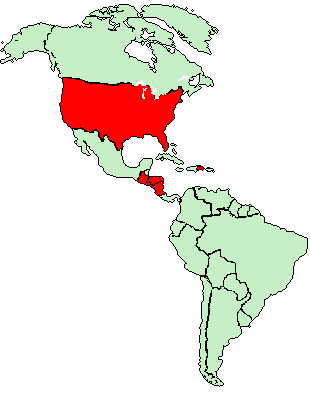Contra el TLC - Against CAFTA
What is CAFTA?
 The U.S.-Central American Free Trade Agreement (CAFTA) is a free trade agreement now being negotiated between the United States and five Central American nations: Guatemala, El Salvador, Honduras, Nicaragua, and Costa Rica. CAFTA extends the North American Free Trade Agreement (NAFTA) to include Central America.
The U.S.-Central American Free Trade Agreement (CAFTA) is a free trade agreement now being negotiated between the United States and five Central American nations: Guatemala, El Salvador, Honduras, Nicaragua, and Costa Rica. CAFTA extends the North American Free Trade Agreement (NAFTA) to include Central America.
What's wrong with NAFTA?
NAFTA has cost Canadians, Mexicans, and U.S. residents hundreds of thousands of stable, well-paying jobs. Environmental and labor standards have suffered in all three countries. But that is just the tip of the problem.
NAFTA set forth a model of international trade built on new «corporate rights,» including the right of corporations and investors to sue governments in special secret trade courts for expropriation of anticipated profits. (In other words, if a government enacts a law or regulation that cuts into the money a corporation thinks it could make, the government must pay for the privilege of enacting that law.) The US, Canadian, and Mexican governments have paid corporations tens of millions of dollars for violating these new «corporate rights» under NAFTA.
CAFTA is a stepping stone toward the FTAA, a trade agreement covering the entire western hemisphere (except Cuba). CAFTA's weak, totally unenforced labor and environmental standards are a dangerous precedent for the FTAA which will create the largest free trade area in the world.
Does Central America want CAFTA?
The governments say «yes» but the people say «no.» This year, CAFTA negotiating sessions in all the Central American countries have been met with massive protests. Opposition is also rising among Central Americans in this country, partly because CAFTA could be the death knell for small farmers and affordable services in the region.
What's the CAFTA timeline?
The final round of negotiations is scheduled December 8-10 in Washington, DC. Then U.S. negotiators are expected to take the completed agreement to the Dominican Republic and say «take it or leave it.» The Bush Administration hopes to bring CAFTA to Congress in the first six months of 2004. The AFL-CIO, environmental organizations, Central American grassroots and labor organizations, and many others will fight it tooth and nail.
